Every winter, millions of people reach for the same shelf-stocked bottles: DayQuil, NyQuil, Sudafed PE, Vicks Formula 44. They’re easy to grab, cheap, and promise relief. But what if most of them don’t actually work? And worse - what if they’re putting your kids or yourself at risk?
Why Your OTC Cold Medicine Might Be Wasting Your Money
The biggest surprise for most people? Oral phenylephrine, the decongestant in nearly every cold medicine on the shelf, doesn’t work. Not at the dose you’re taking. The FDA’s own advisory committee reviewed the science in 2023 and concluded that 10mg of oral phenylephrine - the amount in every bottle of Sudafed PE, Tylenol Cold, and DayQuil - has no meaningful effect on nasal congestion. It’s not a safety issue. It’s a performance failure. The drug simply doesn’t get absorbed well enough from the gut to do anything useful. That’s not speculation. A 2007 meta-analysis found that 10mg of phenylephrine showed no difference from a sugar pill in reducing nasal resistance. Even the 25mg dose - which isn’t sold over the counter - only reduced congestion by about 28%, and patients didn’t even feel better. So why is it still everywhere? Because it’s cheaper and easier to manufacture than pseudoephedrine, which actually works. But pseudoephedrine is kept behind the counter because it can be used to make methamphetamine. So we got the ineffective version on the shelf and the effective one locked away.What About Cough Suppressants and Expectorants?
Dextromethorphan (DXM) is the most common cough suppressant in OTC products. It’s in Robitussin, Mucinex DM, and many multi-symptom cold formulas. But the evidence? Weak. A 2014 review of 29 clinical trials found no consistent benefit for DXM in treating acute cough in adults or children. Guaifenesin, the expectorant meant to thin mucus, has even less support. One study showed it might slightly loosen phlegm, but no study proves it helps you breathe easier or get better faster. The truth? Most OTC cough and cold medicines don’t shorten your illness. They might slightly dull symptoms for a few hours - if they work at all. But they don’t cure anything. And that’s fine if you’re okay with temporary relief. But when you’re paying $10-$15 for a bottle that does nothing, and your kid is taking it every 4 hours, the cost adds up - and so does the risk.Why Kids Are at the Greatest Risk
Children under 6 are the most vulnerable. The FDA has warned since 2008 that OTC cough and cold medicines are not safe or effective for kids under 2. In 2023, that warning expanded to include children under 6. Why? Because their bodies process these drugs differently. A single extra dose - or combining two products with the same ingredient - can lead to seizures, rapid heart rate, or even death. Between 2000 and 2007, 20 children in the U.S. died from accidental overdoses of OTC cold medicines. Thirteen of them were under two years old. Most deaths happened because parents gave multiple products at once - say, a cough syrup and a fever reducer - not realizing both contained acetaminophen or dextromethorphan. That’s not rare. One study found that 40% of parents gave their child more than one OTC cold product on the same day. And here’s the kicker: none of these medicines made those kids better faster. They just added risk. The American Academy of Pediatrics says the only thing you should give a child under 6 for a cough is honey - if they’re over 12 months old. One teaspoon before bed reduced cough frequency and severity as well as some OTC syrups in clinical trials. And it’s safe. And it’s in your pantry.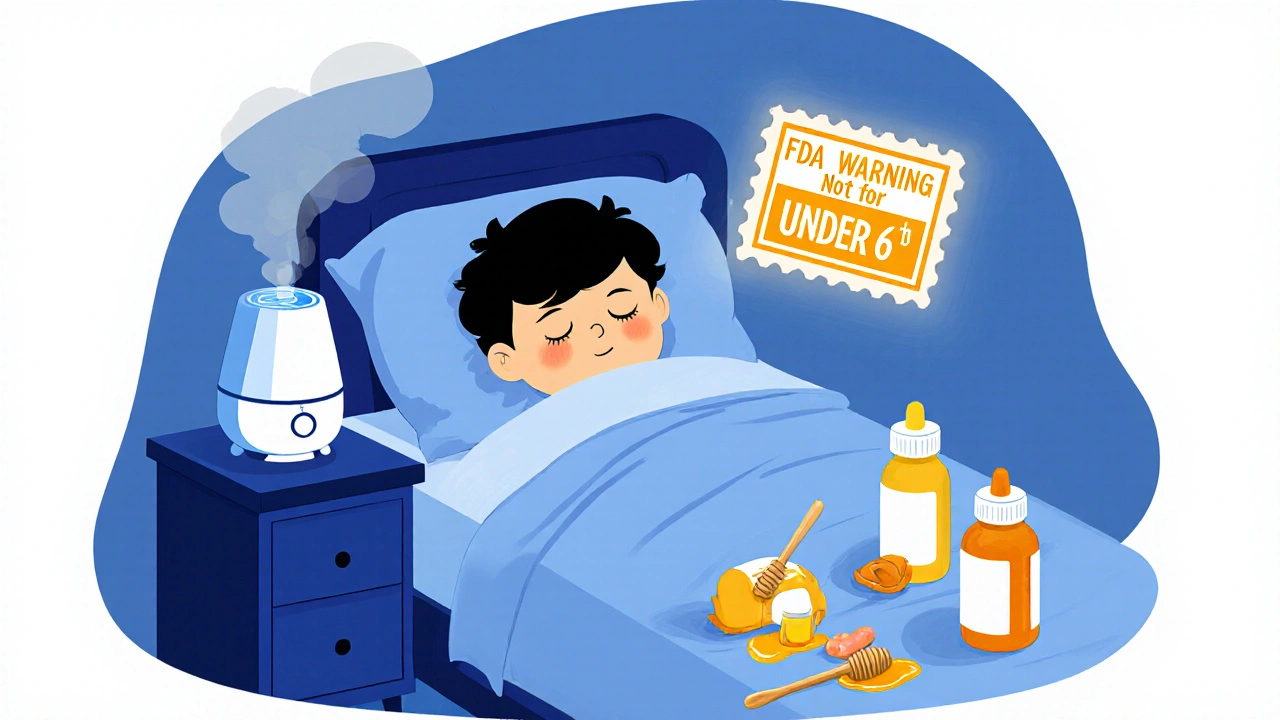
What You Should Be Using Instead
If you’re not taking pills that don’t work, what should you do? Simple, proven, and safe options exist:- Honey - for kids over 12 months: 2.5 mL (half a teaspoon) before bed. Works better than many OTC cough syrups.
- Saline nose drops + bulb syringe - for babies and toddlers. Clears mucus without drugs. Essential for infants who can’t blow their nose.
- Nasal saline spray - for older kids and adults. Moisturizes nasal passages, loosens mucus. No systemic absorption. Zero side effects.
- Humidified air - a cool-mist humidifier in the bedroom helps soothe irritated airways. Especially helpful at night.
- Pseudoephedrine (behind the counter) - if you’re an adult and really need a decongestant, ask for it. It’s the only oral decongestant proven to work. You’ll need ID and your purchase is limited, but it’s worth it.
- Hydration - water, broth, warm tea. Thins mucus naturally and keeps your throat from drying out.
How to Read a Drug Facts Label (And Avoid Dangerous Mistakes)
Most overdoses happen because people don’t read labels. One bottle says “cough and cold,” another says “nighttime relief.” Both contain acetaminophen. You take both. Boom - liver damage. Here’s how to avoid it:- Look for the “Active Ingredients” section - not the brand name.
- Check for duplicate ingredients across products: acetaminophen, dextromethorphan, phenylephrine, guaifenesin.
- Never combine cold medicines unless you’re 100% sure the ingredients don’t overlap.
- Write down what you gave your child and when. Use a simple notes app or a paper log.
- If you’re unsure, ask a pharmacist. They’re trained to catch these mistakes.
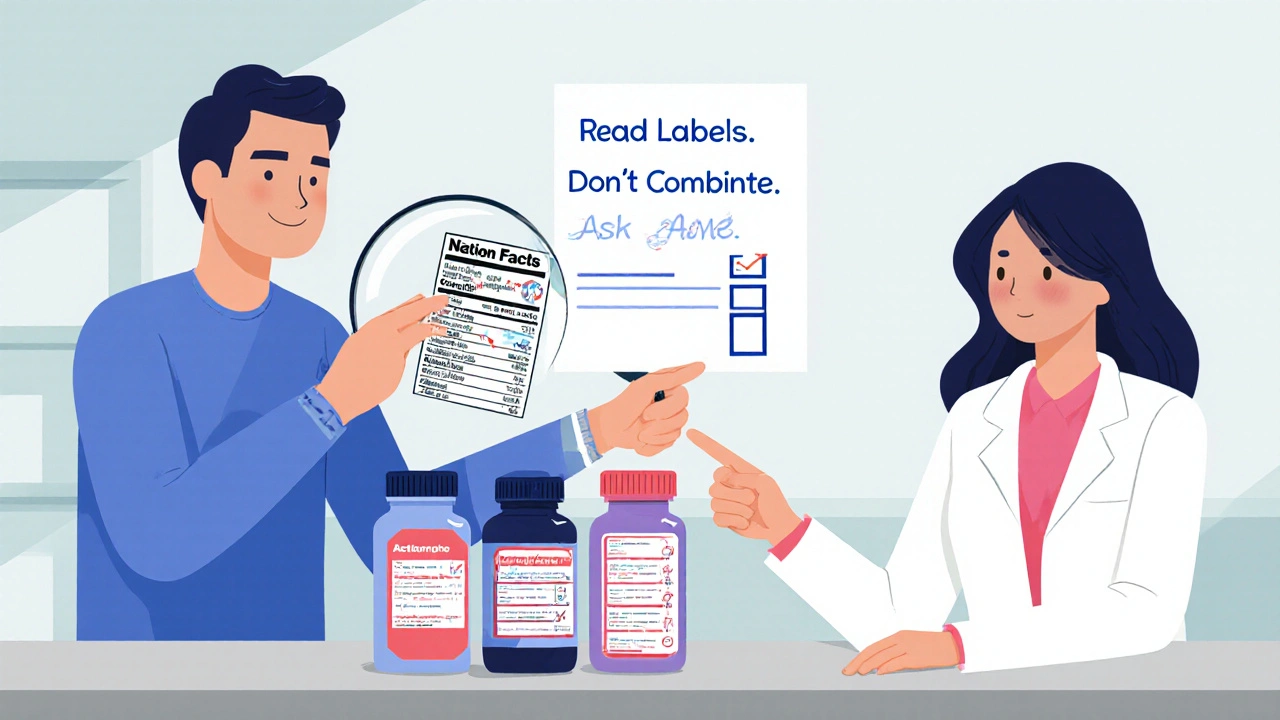
What’s Changing in 2025?
The FDA is moving to remove oral phenylephrine from the list of approved OTC ingredients. If finalized (expected in mid-2025), manufacturers will have to reformulate their products. That means the next time you buy a cold medicine, phenylephrine might be gone - replaced by either pseudoephedrine (behind the counter) or nothing at all. This is a huge shift. Since the 1970s, phenylephrine has been the go-to decongestant in OTC products. Now, the science is forcing the market to change. Companies like Johnson & Johnson, Procter & Gamble, and Bayer are already preparing new formulas. You’ll start seeing labels that say “phenylephrine-free” or “contains no decongestant.” Sales of OTC cold medicines have already dropped 15% since the FDA’s 2023 announcement. People are catching on. Amazon reviews for phenylephrine-containing products have plummeted from 4.1 stars in 2020 to 3.2 stars today. The most common complaint? “Wasted money. Didn’t help at all.”What to Do Today
You don’t need to wait for new labels to make smarter choices. Here’s your action plan:- For adults: Skip products with phenylephrine. If you need a decongestant, ask for pseudoephedrine. Use saline spray for congestion. Try honey for cough.
- For kids over 12 months: Honey before bed. Saline drops. Humidifier. Skip all OTC cough and cold syrups.
- For babies under 12 months: No honey. No OTC meds. Just saline drops, suction, fluids, and rest.
- For everyone: Read labels. Don’t combine products. When in doubt, call your pharmacist.
Cold and cough medicines aren’t evil. But they’re not magic either. The real power lies in simple, safe, science-backed tools - not in a brightly colored bottle with a promise you can’t prove.
Is it safe to give OTC cough medicine to a 3-year-old?
No. The FDA and the American Academy of Pediatrics strongly advise against giving any over-the-counter cough or cold medicine to children under 6. These medicines don’t work for young kids, and they carry serious risks - including rapid heart rate, seizures, and even death from accidental overdose. For a 3-year-old with a cough, use honey (if they’re over 12 months), saline nose drops, and a humidifier instead.
Does phenylephrine really not work?
Yes. Multiple clinical studies, including a 2007 meta-analysis and the FDA’s 2023 review, show that the 10mg dose of oral phenylephrine found in most cold medicines has no meaningful effect on nasal congestion. It doesn’t reduce stuffiness any better than a placebo. The ingredient was approved decades ago based on weak evidence, and now the science has caught up. The FDA is moving to remove it from OTC products.
What’s the best OTC cold medicine for adults?
There’s no single “best” product because most multi-symptom formulas contain ineffective ingredients. Instead, treat symptoms individually: use pseudoephedrine (behind the counter) for congestion, guaifenesin only if you feel it helps with mucus (evidence is weak), and avoid dextromethorphan unless you’re sure it helps your cough. Many adults find that saline spray, honey, and rest work better than any pill. If you must use a multi-symptom product, choose one with just acetaminophen for pain and fever - and nothing else.
Can I take OTC cold medicine with my other prescriptions?
Some OTC cold medicines can be dangerous when mixed with other drugs. Decongestants like pseudoephedrine and phenylephrine can spike blood pressure and cause heart rhythm problems if taken with MAO inhibitors, tricyclic antidepressants, or certain blood pressure medications. Dextromethorphan can interact dangerously with SSRIs and other antidepressants, leading to serotonin syndrome. Always check with your pharmacist before combining any OTC medicine with your regular prescriptions.
Why is honey recommended for coughs?
Honey coats the throat, reduces irritation, and has mild antimicrobial properties. Clinical studies show that one teaspoon of honey before bed reduces cough frequency and severity in children over 12 months as well as, or better than, many OTC cough syrups. It’s natural, cheap, and safe - unlike many OTC options. Don’t give honey to babies under 12 months due to the risk of botulism.
Are nasal decongestant sprays better than pills?
Yes - if you’re using them correctly. Nasal sprays like oxymetazoline (Afrin) work faster and more effectively than oral decongestants because they act directly on the nasal passages. But they’re only meant for 3 days. Longer use causes rebound congestion. For long-term relief, saline sprays are safer and just as effective. They don’t contain drugs, don’t cause rebound, and can be used daily.
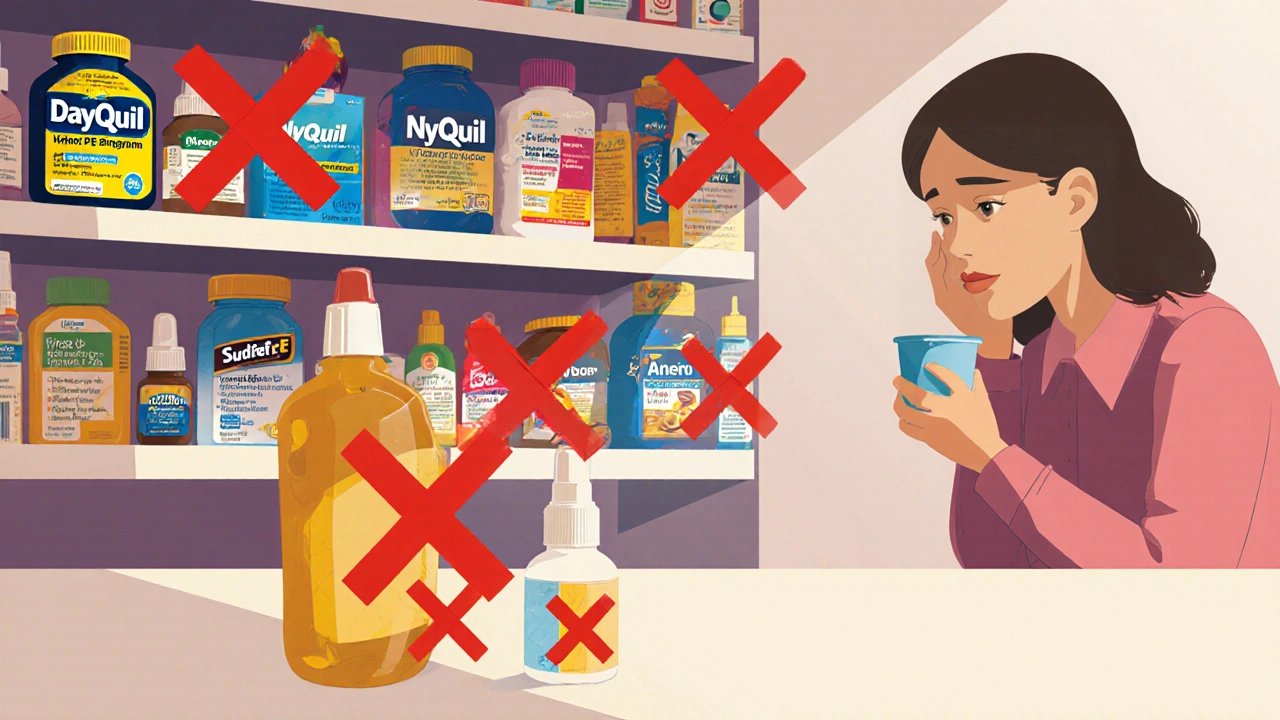
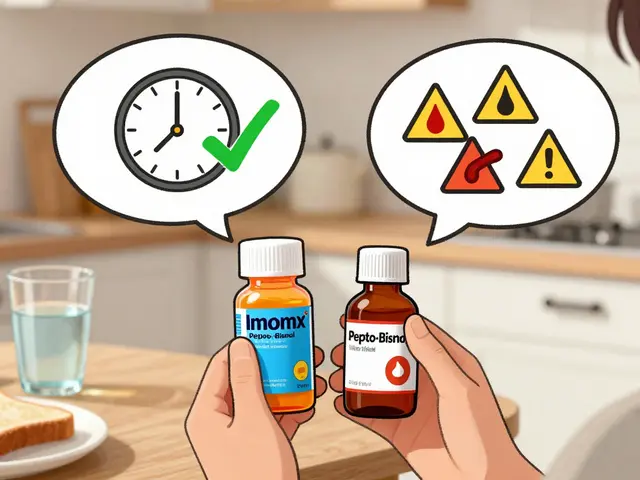
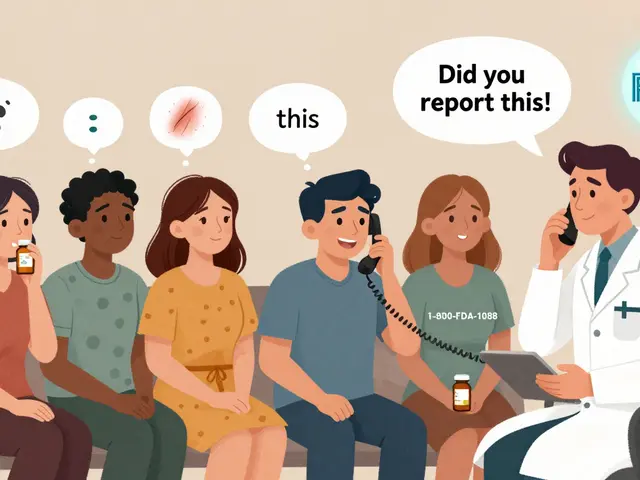
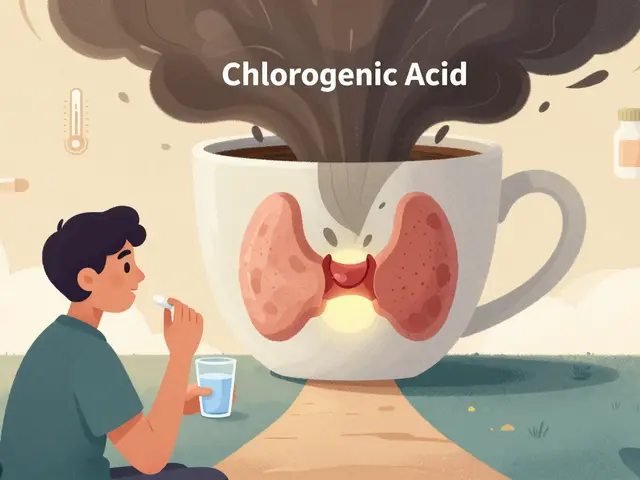
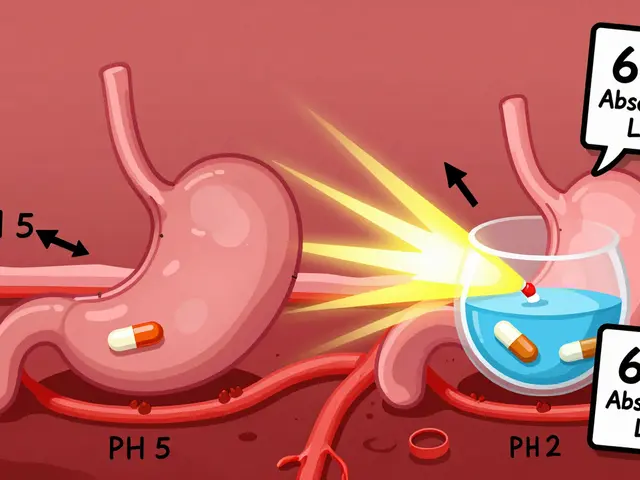

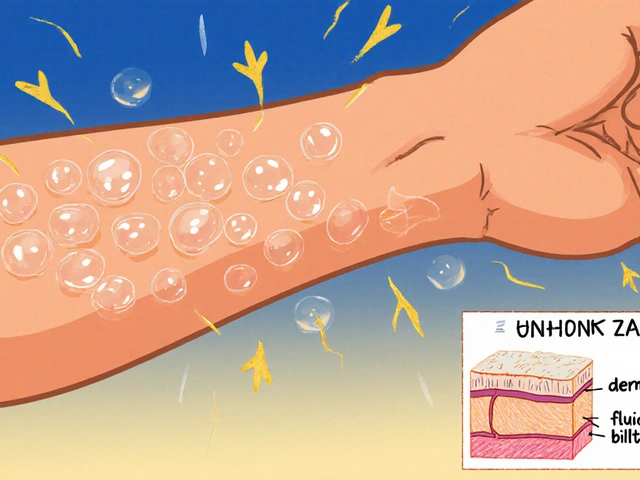
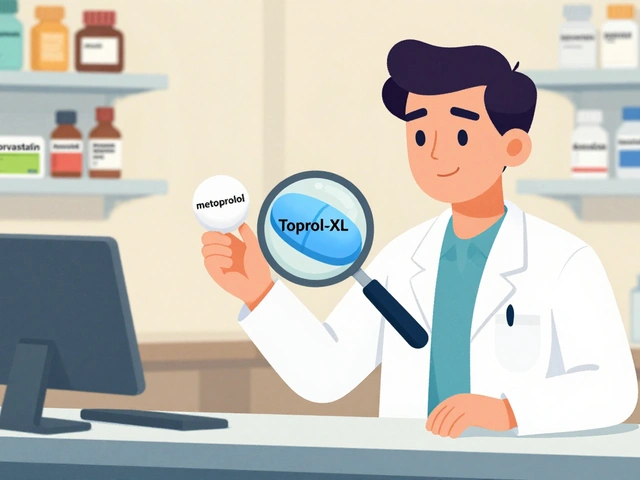
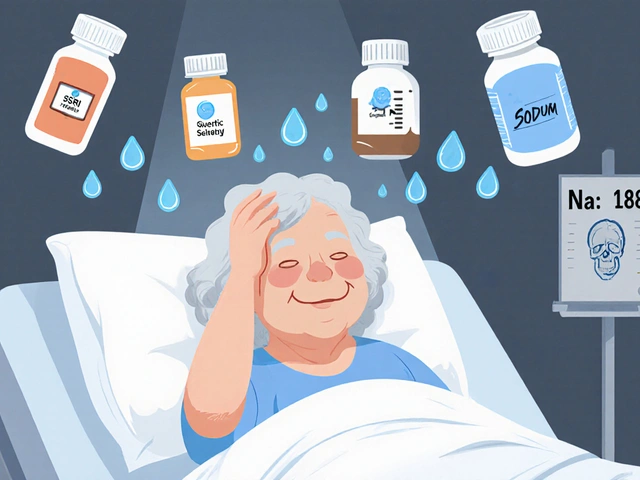

13 Comments
Just read this and immediately threw out my entire cabinet of DayQuil and NyQuil. No joke. I’ve been taking that stuff for years thinking it was helping. Turns out I was just paying for placebo and a fancy bottle. 😅
As a pharmacist, I can confirm the phenylephrine debacle. The FDA’s 2023 review was a long time coming. The pharmacokinetics are garbage-oral phenylephrine undergoes near-total first-pass metabolism. It’s literally a chemical ghost. Pseudoephedrine? 80% bioavailability. That’s not even close. And yes, the behind-the-counter restriction is a regulatory artifact tied to meth concerns, not efficacy. We’ve been screaming this for decades.
Also, dextromethorphan? Half the studies show no benefit over placebo for acute cough. Guaifenesin? Maybe loosens mucus but zero impact on symptom duration. Honey? Surprisingly robust data for kids >12mo. Saline irrigation? Zero risk, high ROI. Why are we still selling snake oil?
THIS IS A BIG PHARMA COVERUP. You think they’re just ‘ignoring science’? No. They’re PROFITING. Phenylephrine is CHEAPER. They know it doesn’t work. They know pseudoephedrine works. But if you can lock the real stuff behind the counter and sell the fake stuff on the shelf? That’s a $2 billion market. And they’ve been bribing regulators for decades. The FDA? Bought and paid for. The ‘2025 removal’? A PR stunt to make you think they care. They don’t. They just need to rebrand the poison.
And honey? Yeah, sure. But why isn’t Big Honey lobbying for this? Because honey doesn’t have patent rights. It’s nature. And nature doesn’t pay dividends. Wake up.
I just... I don't know. I mean, I've always used this stuff, and I don't feel like I've been poisoned yet? Maybe I'm lucky? Or maybe it's just... placebo? I'm confused. Also, why is honey recommended? Isn't that just... sugar? I'm not convinced. I'll probably still buy the blue bottle.
OMG. I just realized I’ve been giving my 4-year-old cough syrup since she was 1. I thought it was helping. I thought I was being a good mom. I’m crying. I’m literally crying. And now I feel like a monster. Why didn’t anyone tell me? Why is this not on the label? Why is this even legal? I’m never trusting another bottle again.
saline spray works. honey works. humidifier works. i stopped buying the pills. my colds are shorter now. no idea why everyone still buys the stuff.
Thank you for this. I’ve been telling my friends for years that honey is better than syrup for coughs, and they always looked at me like I was crazy. 😭 I cried when I read about the kids dying from overdoses. It’s not just about money-it’s about safety. I’m printing this out and giving it to my sister who just had a baby. Please, if you’re reading this and have a toddler-stop. Just stop. Use the honey. Use the saline. Use your brain. You don’t need a bottle to be a good parent.
Bro, this is the kind of post that makes me proud to be part of this community. You didn’t just rant-you educated. And you did it with facts, not fear. 🙌
As someone from India, where Ayurveda and home remedies are still common, I’ve always seen honey, steam inhalation, and turmeric milk as the real MVPs. We didn’t need Big Pharma to tell us what works. We just needed someone to validate it with science.
Also, props for mentioning pharmacist consultation. Too many people skip that step. A pharmacist isn’t just a pill dispenser-they’re your last line of defense against dangerous combos. Go talk to one. They’ll thank you.
And yes, the phenylephrine thing? Classic. They kept it because it’s easier to manufacture than pseudoephedrine. But they didn’t care about the outcome. Just the profit margin. Sad.
Let’s hope the 2025 shift sticks. Maybe then we’ll start seeing real change-not just labels.
Wait. You’re telling me that people actually believe honey works better than medicine? That’s ridiculous. I mean, come on. Honey is just sugar. And saline spray? That’s just salt water. You’re telling me that’s better than a pharmaceutical-grade formula? That’s not science-that’s superstition. And don’t even get me started on the ‘humidifier’ nonsense. If you’re not taking a real drug, you’re just wasting time. And for kids? You’re risking their health by not medicating them properly. I’m sorry, but this post is dangerously naive.
Thank you for writing this. I’m a mom of two, and I’ve been terrified to give my kids anything OTC since they were babies. I always used honey and saline, and people would look at me like I was a hippie. But now I feel validated. I’m sharing this with my entire family group chat. I hope more parents see this. We don’t need to be afraid of not medicating-we need to be afraid of medicating wrong.
nah mate. phenylephrine works fine. i’ve been takin it for years. you just dont know how to use it right. maybe you need to take more? or maybe you just got a bad batch. also honey? thats for babies. adults need real medicine. and dont even get me started on that ‘behind the counter’ thing. why should i have to show id just to get a decongestant? this is a free country.
OMG I just shared this with my entire group chat. Everyone’s been asking me why I don’t take cold meds anymore. Now I can just send them this. I’ve been using honey since last winter and my cough literally vanished in two days. No more 3 a.m. coughing fits. Also, I bought a humidifier and now I’m basically a wellness influencer. 😌✨
This is the most ridiculous, anti-science, anti-pharma propaganda I’ve ever read. You’re telling people to use honey? Honey is not a drug. It’s not regulated. It’s not tested. It’s not FDA-approved. You’re advocating for unproven, unstandardized, potentially dangerous alternatives. This isn’t ‘science-backed’-it’s dangerous pseudoscience. And you’re putting children at risk by telling parents to avoid proven (even if imperfect) treatments. Shame on you.